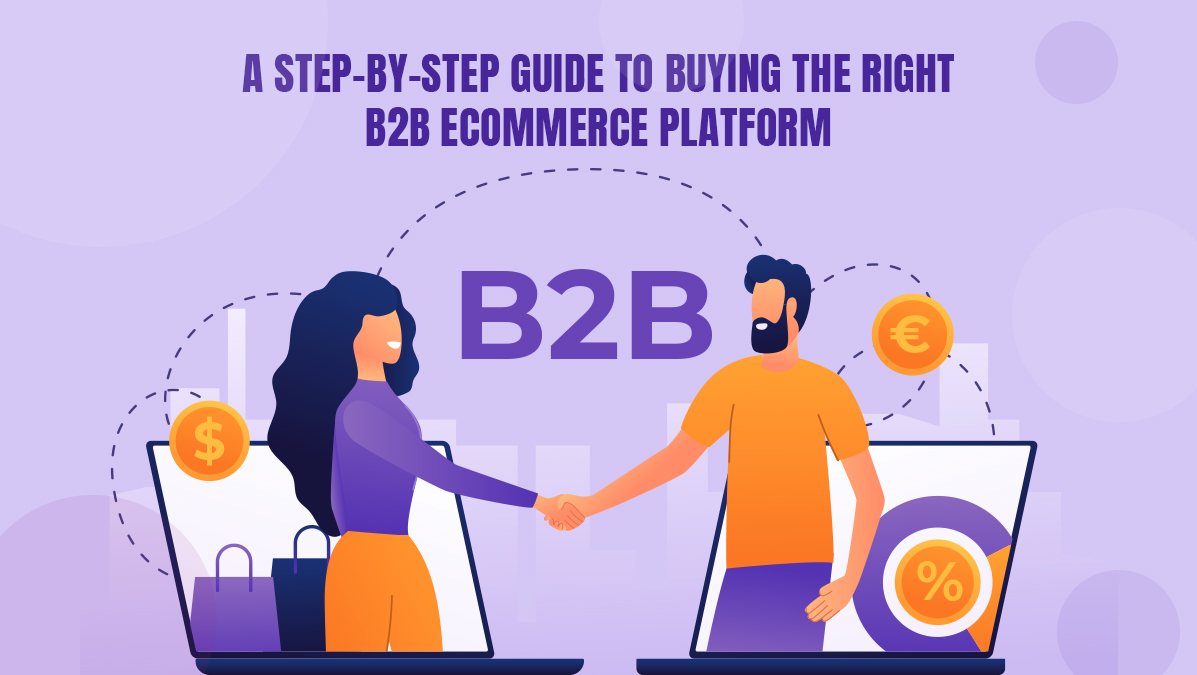In this modern-day digital age, traditional business-to-business (B2B) transactions are no longer confined to brick-and-mortar establishments and phone calls. With the advent of B2B eCommerce platforms, businesses now have the opportunity to expand their reach, streamline operations, and connect with partners and customers on a global scale.
In this blog, we will look into the world of B2B eCommerce platforms, explore what they are, highlight popular platforms in the market, and provide detailed steps on how to choose the right B2B eCommerce platform for your business.
Before diving into the selection process, it’s crucial to grasp the concept of B2B eCommerce platforms.
Let’s begin!
What are B2B eCommerce Platforms?
Simply put, a B2B eCommerce platform is an online marketplace that facilitates the buying and selling of goods and services between businesses. These platforms serve as digital intermediaries, providing a seamless and efficient environment for B2B transactions.
Unlike business-to-consumer (B2C) eCommerce platforms, which primarily cater to individual consumers, B2B eCommerce platforms cater specifically to businesses. They offer features and functionalities tailored to the unique needs of B2B transactions, such as bulk ordering, negotiated pricing, and complex order workflows. B2B eCommerce platforms provide a centralized hub where businesses can showcase their products or services, manage inventory, process orders, and handle customer relationships.
Popular B2B eCommerce Platforms
The B2B eCommerce landscape is brimming with various platforms, each offering its own set of features and advantages.
Here are some of the popular B2B eCommerce platforms widely used by businesses:
· Magento Commerce: Magento Commerce is a robust and scalable B2B eCommerce platform that caters to businesses of all sizes. It offers a wide range of features, including flexible product catalogs, advanced pricing options, personalized customer experiences, and powerful integrations with other business systems. Magento Commerce provides businesses with the tools they need to create a highly tailored and efficient B2B eCommerce experience.
· Shopify Plus: Shopify Plus is a popular B2B eCommerce platform known for its ease of use and scalability. It offers a comprehensive suite of features, including multi-channel selling, wholesale pricing, advanced analytics, and customizable workflows. With its user-friendly interface and extensive app marketplace, Shopify Plus empowers businesses to create a seamless and personalized B2B buying journey.
· BigCommerce B2B: BigCommerce B2B is a feature-rich platform specifically designed for B2B eCommerce. It offers a comprehensive set of tools for managing complex B2B operations, such as customer-specific pricing, quote management, and custom catalogs. BigCommerce B2B provides businesses with the flexibility to customize their online stores and streamline their B2B sales processes.
· Salesforce B2B Commerce: Salesforce B2B Commerce, formerly known as CloudCraze, is a powerful B2B eCommerce platform built on the Salesforce ecosystem. It seamlessly integrates with Salesforce CRM, allowing businesses to leverage customer data and provide personalized buying experiences. Salesforce B2B Commerce offers a range of B2B-specific features, including account-based pricing, complex product configurations, and self-service portals.
· Oracle Commerce Cloud: Oracle Commerce Cloud is a comprehensive B2B eCommerce platform that combines flexibility, scalability, and robust functionality. It offers a wide array of features, including B2B pricing and quoting, personalized catalogs, and seamless integration with Oracle’s suite of business applications. Oracle Commerce Cloud empowers businesses to deliver exceptional B2B buying experiences while leveraging powerful backend systems.
These are just a few examples of the popular B2B eCommerce platforms available in the market. It’s essential to thoroughly evaluate each platform’s features, pricing, scalability, and compatibility with your business requirements before making a decision.
How to Choose the Right B2B eCommerce Platform?
Choosing the right B2B eCommerce platform for your business is a critical decision that can significantly impact your operations and growth.
To help you navigate this process, we have outlined a step-by-step guide:
Step 1: Assess Your Business Needs
Start by assessing your specific business needs and requirements. Consider factors such as the complexity of your product catalog, the volume of orders you handle, integration with existing systems, and desired scalability. Identify the key features and functionalities that are crucial for your B2B eCommerce operations.
Step 2: Evaluate Platform Features
Research and compare the features offered by different B2B eCommerce platforms. Look for features such as advanced product catalog management, personalized pricing and quoting, flexible order workflows, seamless integration capabilities, and robust analytics and reporting. Determine which platforms align closely with your identified business needs.
Step 3: Consider Scalability and Customization
Evaluate the scalability and customization options of each platform. Assess whether the platform can grow with your business and accommodate future needs. Consider the level of customization required to align the platform with your brand and business processes. Look for platforms that offer a balance between flexibility and ease of use.
Step 4: Review Integration Capabilities
Check the integration capabilities of each platform. Ensure that the platform can seamlessly integrate with your existing systems, such as ERP, CRM, and inventory management software. Smooth integration eliminates data silos and enhances operational efficiency. Look for platforms that offer pre-built integrations or robust APIs for easy connectivity.
Step 5: Assess Security and Compliance
Security is paramount when it comes to B2B eCommerce. Assess the security measures implemented by each platform, such as data encryption, secure payment gateways, and compliance with industry standards like PCI DSS. Consider any specific security requirements that are essential for your business, especially if you handle sensitive customer data.
Step 6: Evaluate Pricing and Total Cost of Ownership
Carefully evaluate the pricing models of each platform and consider the total cost of ownership over the long term. Look for transparent pricing structures that align with your budget and projected growth. Consider factors such as licensing fees, transaction fees, hosting costs, and any additional expenses related to customization or third-party integrations.
Step 7: Seek Recommendations and Reviews
Research customer reviews, case studies, and testimonials of businesses that have implemented the B2B eCommerce platforms you are considering. Seek recommendations from industry experts or peers who have firsthand experience with these platforms. Real-world feedback can provide valuable insights into the platform’s performance, support, and overall user satisfaction.
Step 8: Request Demos and Trials
Request demos and trials from shortlisted platforms to gain hands-on experience. This will allow you to explore the platform’s interface, usability, and overall user experience. Pay attention to the platform’s intuitiveness, ease of navigation, and the availability of comprehensive documentation and support resources.
Step 9: Engage with the Vendor
Engage in discussions with the vendors of the shortlisted platforms. Seek clarifications on any concerns or questions you may have regarding the platform’s capabilities, implementation process, ongoing support, and future upgrades. Consider the level of customer support and responsiveness offered by the vendors.
Step 10: Make an Informed Decision
Based on your assessments, evaluations, and engagement with vendors, make an informed decision on the B2B eCommerce platform that best aligns with your business needs, budget, and long-term goals. Keep in mind that choosing the right platform is a strategic investment that can propel your B2B operations to new heights.
In conclusion,
B2B eCommerce platforms have revolutionized the way businesses conduct transactions, allowing for streamlined processes, enhanced customer experiences, and global connectivity. By understanding the concept of B2B eCommerce platforms, exploring popular platforms in the market, and following a systematic selection process, you can choose the right platform that will empower your business to thrive in the digital landscape.
Remember, the right B2B eCommerce platform should align with your unique business requirements, offer scalability and customization options, integrate seamlessly with your existing systems, prioritize security and compliance, and provide comprehensive support and resources. By investing time and effort into choosing the right platform, you set your business on a path to success in the dynamic world of B2B eCommerce.
For expert guidance on selecting the best B2B ecommerce platform, reach out to 18th DigiTech, the best web development company. Benefit from personalized walkthroughs and seamless integration assistance tailored to your business needs.








 About 18th Digitech
About 18th Digitech Awards and Credentials
Awards and Credentials Our Partners
Our Partners Press/Events
Press/Events
